Netherlands Voices Support For Listing IRGC As Terror Group
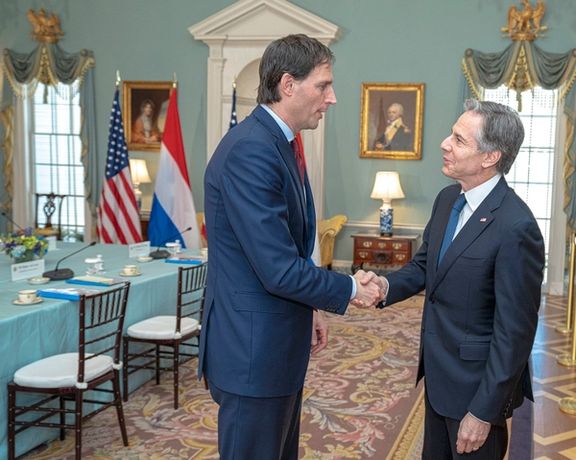
As the European Council is set to decide about European Parliament’s call to list Iran’s Revolutionary Guard as a terror group, the Netherlands has already expressed its support.

As the European Council is set to decide about European Parliament’s call to list Iran’s Revolutionary Guard as a terror group, the Netherlands has already expressed its support.
Dutch Foreign Minister Wopke Hoekstra said in a tweet on Thursday that “The Netherlands is strongly in favour of listing the IRGC as an entity, a step that requires the joint commitment of EU member states.”
He added that he held talks with High Representative of the EU for Foreign Affairs and Security Policy Josep Borrell about Russia and Iran.
“We also addressed the grave human rights violations in Iran,” he said, noting that “We need to continue to sanction those responsible.”
Hoekstra also said he will also hold talks with German Foreign Minister Annalena Baerbock to address this issue at the upcoming EU Foreign Affairs Council.
The Dutch foreign minister also held talks with US Special Envoy for Iran Robert Malley. “Productive meeting with Foreign Minister Hoekstra. We discussed our common steps to confront Iran's human rights abuses and counter its provision of weapons to Russia for use in its brutal war of aggression against Ukraine,” Malley said.
Although the European Parliament overwhelmingly passed the non-binding resolution on January 19, it cannot decide to designate the IRGC, which is an issue within the purview of the EU Council, comprised of ministers of each EU country. If the resolution garners enough support, it is then upon the national governments of the EU member states to make the final decision. The listing of the IRGC must have a unanimous vote by all 27 EU members in the EU Council.
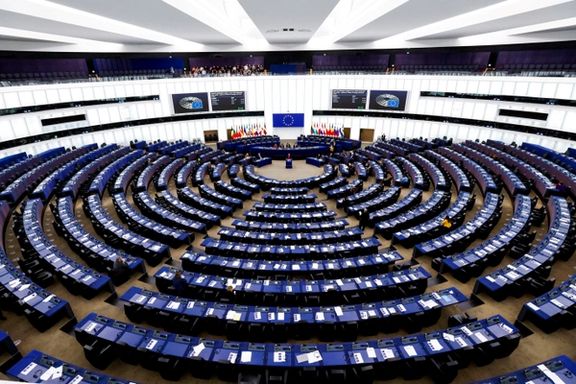
While many Iranians welcomed the European Parliament’s resolution that calls on EU to list the Revolutionary Guard as a terrorist group, regime officials have threatened to respond.
After the European Parliament overwhelmingly passed the resolution Thursday that may eventually lead to the designation of the IRGC, people on social media started to congratulate each other, describing it as yet another victory for their revolt against the clerical regime.
Since the beginning of the current wave of antigovernment protests ignited by a Iranian young woman – Mahsa Amini – the Iran’s government is becoming more isolated in the international community. So far, the Islamic Republic was voted out from the United Nations Commission on the Status of Women (CSW) for policies contrary to the rights of women and girls in December. Another step was by the Geneva-based UN Human Rights Council’s decision on November 24 to launch an independent investigation into the regime’s deadly repression of protests that has killed around 500 civilians, including about 60 children. Several rounds of sanctions by the European Union, the US, Canada and others also targeted officials and entities involved in the crackdown.
According to social media videos, people in some Kurdish cities, including Saqqez – the hometown of Amini -- and Mahabad, came to the streets and rejoiced with fireworks following the approval of the resolution.
Videos sent to Iran International from different cities such as Qom – home to Iran’s biggest seminary -- and the southern city of Bandar Abbas show people distributing candies to celebrate the decision. In one video, someone said that they are watching the European Parliament’s session live on Iran International TV, adding that it is more exciting than the World Cup matches.
Meanwhile, Islamic Republic’s officials, who had started threatening Europe even before the vote, have intensified their rhetoric against European countries over the decision.
Foreign Ministry spokesman Nasser Kanaani said the reason for the designation of IRGC as a terrorist organization is that Europe is infuriated over the IRGC’s leading role in the fight against terrorism. “The reason behind the anger of the ‘global club of terrorists’ is crystal clear. The IRGC is the world’s largest counter-terrorism institution,” he wrote in a tweet on Friday.”
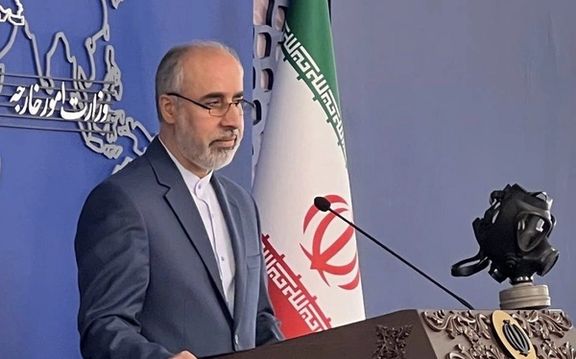
In a statement on Friday, the Army condemned the move, claiming that it exposed the enemies’ grudge against the Islamic establishment in Iran. “The measure of the European Parliament, which claims to be fighting terrorism, against an anti-terrorist institution is out of their desperation and failure in supporting recent riots in Iran,” read the statement.
Hardliner Iranian lawmaker Mohammad Esmail Kowsari, himself a former IRGC commander, said on Friday, "One should ask where the IRGC has committed terrorist acts. They conspired to overthrow the Islamic Republic and the IRGC foiled it." Vowing that the parliament will announce its retaliatory measures on Sunday, he asked, “What part of the IRGC is a terrorist group?”
Criticizing the motion, Speaker of Iran’s parliament, Mohammad Bagher Ghalibaf, said that “If the European Union makes such a decision and lists the Guards as a terrorist organization, it means that the European Union acts as a supporter of terrorism, because the IRGC is the biggest and most successful anti-terrorist entity.”
The whole argument of the Islamic Republic in defense of the IRGC – which has armed proxies in many countries across the region – is its limited role in the battle against the ISIS. But in fact, IRGC was building its own Shiite militant proxy network and to an extent fought against the Sunni extremist group.
The European Parliament cannot decide to designate the IRGC because the terrorists list is not a list decided by the Parliament itself but by the EU Council, comprised of ministers of each EU country. If the resolution garners enough support, it is then upon the national governments of the EU member states to make the final decision. The listing of the IRGC must have a unanimous vote by all 27 EU members in the EU Council.
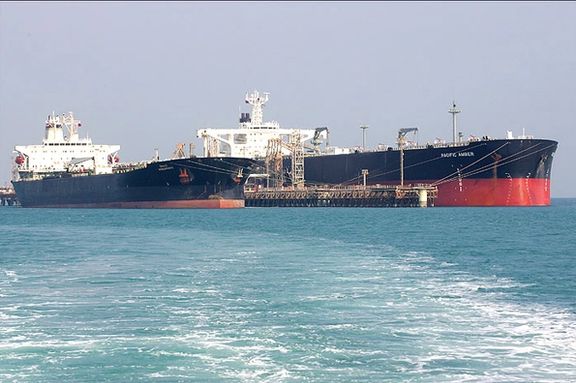
Panama’s shipping registry says it has withdrawn its flag from 136 vessels linked to Islamic Republic in the last four years, denying claims it is knowingly helping Iran violate sanctions.
"The Panamanian registry canceled 136 ships in which their direct link with the National Iranian Oil Company (NIOC) was proven," Panama's Maritime Authority (AMP), said in a statement late on Tuesday. According to the US Treasury, the NIOC has strong links with Iran’s Islamic Revolutionary Guard Corps, which is coordinating the country’s sanctions evasion campaign.
An AMP spokesperson said that one-fifth of the 678 ships for which the registry withdrew flags for various reasons since 2019 were Iran-linked, adding "Panamanian authorities maintain a close relationship with the US secretary of the Treasury and other authorities of the United States.
Providing its flag to some 8,650 ships, the AMP runs the world’s largest vessel registry with 16 percent of the global fleet. It denied failing to act on evidence that tankers operating under its flag had shipped Iranian crude oil in contravention of US sanctions, reacting to allegations by United Against Nuclear Iran (UANI), which seeks to prevent the Islamic Republic from becoming a nuclear-armed regional superpower.
On Monday, former Florida Governor Jeb Bush, who is a member of UANI, called on Washington to pressure Panama to stop "helping" Tehran to evade sanctions.
Shipments of Iranian crude were much higher in 2022 than in 2019 and 2020, when US sanctions had a greater impact. Iran boosted illicit shipments to China from late 2020 as Joe Biden got elected US president and pledged to return to the 2015 nuclear deal, the JCPOA.
Earlier in the month, Iranian navy commander Rear Admiral Shahram Irani said Tehran is planning to extend its area of operation to the Panama Canal that divides South and North America.

The German foreign ministry confirmed Friday that a plan to sanction more members of Iran’s Revolutionary Guard will be on the agenda at EU foreign ministers meeting on Monday.
Two sources told Reuters Thursday that the European Union will add 37 individual entries to its sanctions against Iran on Monday as the bloc is working on listing Tehran's Revolutionary Guards (IRGC) as a terrorist organization.
"We will adopt the fourth package of sanctions against Iran on Monday, and we believe we should already start working on the fifth one to list IRGC as a terrorist organization," said one of the sources, an EU diplomat.
Both sources said 37 new names would be blacklisted for human rights violations when the bloc's foreign ministers meet on Monday. The sanctions would mean the IRGC members would not be allowed to travel to the EU and any assets they hold in Europe would be frozen.
The EU diplomat added, however, that the IRGC would not be sanctioned as an organization - yet.
"If you do this, it has to be legally sound and that is being discussed right now. But it won't be ready for Monday."
The European Parliament Thursday overwhelmingly approved a resolution asking the EU to list the IRGC as a terrorist group.
The EU's chief executive, European Commission President Ursula von der Leyen, earlier this week backed the listing of the IRGC as a terrorist organization in response to what she said was the trampling of fundamental human rights in the Islamic republic.
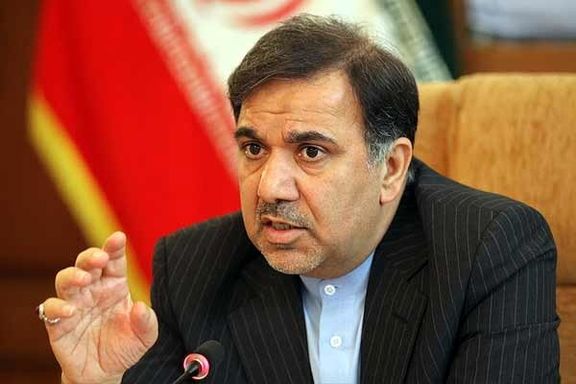
Some Iranian ‘moderate conservative’ politicians suggest that Iran should act to compensate for the damage and isolation caused by a problematic foreign policy.
Correcting Iran's policy regarding Russia's war in Ukraine, by adopting a neutral stance, is a recurrent suggestion.
As the European parliament overwhelmingly voted to support the designation of Iran’s Revolutionary Guard, the IRGC, as a terrorist organization, University lecturer and former housing minister Abbas Akhoundi suggested that Tehran should enter transparent and direct talks with the EU to shed light on its positions about the war in Ukraine.
In fact, Tehran has tried several times to whitewash its support for Russia in the Ukraine war and the deployment of its drones to Russia, but no one even in Iran has accepted the regime’s claims of neutrality, as evidence about the destructive role of Iranian drones in attacks on civilian targets is damning.
Meanwhile, Akhoundi said that Russia should not drag Iran into a war it is not a part of. He further maintained that Iran's involvement in the war in Ukraine is the main cause of rising tensions between Tehran and the European Union. The resulting adverse impact on the suspended nuclear talks cannot be compensated, Akhoundi said, adding that resolving the controversy about Iran's role in the Ukraine war is even more urgent than trying to revive the 2015 nuclear deal known as the JCPOA.
He added that leaving behind this crisis needs a level of intelligence which is beyond the Iranian government's capacity. He said this comes while some members of the European Parliaments have questioned the legitimacy of the Islamic Republic. This, Akhoundi said, will prepare the world's public opinion for any action against Iran.
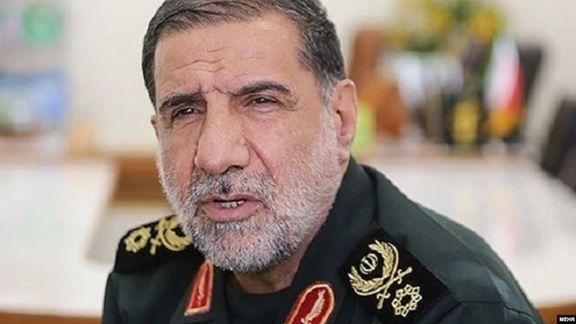
He argued that aggressive responses by some Iranian officials plays into the hands of “warmongers” in Europe. Akhoundi was possibly referring to IRGC general and Iranian lawmaker Esmail Kowsari's threats against Europe in case the EU lists the IRGC as a terrorist organization.
Akhoundi said that as a result of a failing foreign policy, Iran lags behind its development plans, international trade has been disrupted, inflation is beyond control and poverty can be seen everywhere while the society in on the verge of collapse.
Former lawmaker Ali Motahari had also earlier criticized Iran's foreign policy which he said was marked by over-reliance on Russia and China and called for an improvement in Iran's ties with the West. He told Sharq newspaper on Wednesday that "Iran's involvement in the war in Ukraine is the main problem that has ruined Iran's relations with Europe.”
Motahari added: "Iran's involvement in the war in Ukraine has prompted the UK parliament as well as the European Parliament to follow an anti-Islamic-Republic policy, as the war in Ukraine has generally affected the security of the entire European continent."
Mehdi Ayati, another political observer also said that Iran's problems will not be solved as long as Tehran is not determined to communicate with the world. Because of Iran's ideological foreign policy, it would have not made any difference even if reformist Mohammad Khatami was president, instead of the ultraconservative Ebrahim Raisi.
Ayati characterized the current situation as a foreign relations impasse which will not be resolved before Iran proves to be genuinely interested in a reproachment. He added that Iran's main problem is mismanagement, not sanctions. Pointing out Iran's foreign policy crisis, Ayati charged that "unfortunately, some Iranian officials' actions and rhetoric widen the gap between Iran and the world community.”

Speaker of Iran’s parliament, Mohammad Bagher Ghalibaf has criticized the motion passed by the European Parliament to list the IRGC as a terrorist organization.
Ghalibaf speaking on Friday said that “If the European Union makes such a decision and lists the Guards as a terrorist organization, it means that the European Union acts as a supporter of terrorism, because the IRGC is the biggest and most successful” anti-terrorist entity.
Ghalibaf was a senior IRGC officer before officially becoming a politician and close friend of Qassem Soleimani who led Iran's military interventions in regional countries.
Ghalibaf was referring to what Iranian officials often claim was the IRGC’s key role in defeating the Islamic State group in Iran and Syria.
Iran’s Revolutionary Guard intervened in the Syrian civil war to assist the government of Bashar al-Assad against the opposition in 2011, years before ISIS emerged as a threat.
In Iraq, many argue, Iran’s program to create Shiite militia forces predated the emergence of ISIS and played a role in inflaming Sunni resentment in the first place.
Although these militias did fight against ISIS, but the determining factor was the role the United States and an international coalition played by air support, weapons and training to the Iraqi army to defeat the extremist Sunni group.
Ghalibaf accused the West of creating and financing ISIS, which without IRGC’s intervention would have attacked London and Paris, he argued. He did not explain why ISIS would have attacked Europe if the West created it.
He threatened that if the European Parliament’s resolution adopted January 19 becomes a final decision by the EU, the Iranian parliament will retaliate “in kind.”